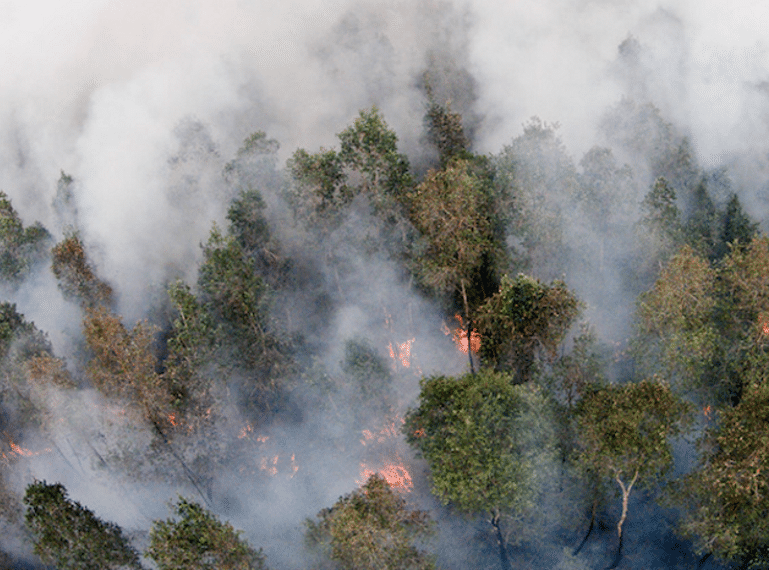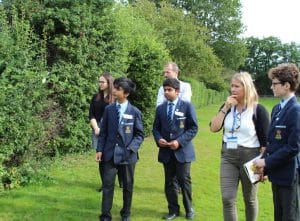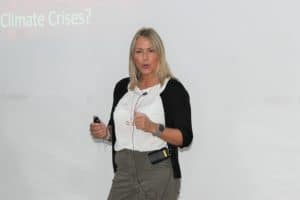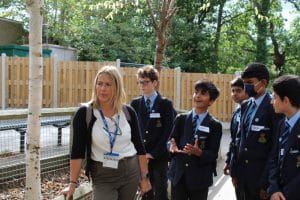
In a special lecture assembly, QE’s younger boys learned the shocking truth about the loss of biodiversity and then discovered what they could do to support the natural environment.
 Lesley Malpas, Founder and Chief Executive of not-for-profit organisation, Operation Future Hope, not only outlined problems around the world, but also examined environmental depredation close to home, explaining that Britain suffers some of the world’s worst biodiversity loss.
Lesley Malpas, Founder and Chief Executive of not-for-profit organisation, Operation Future Hope, not only outlined problems around the world, but also examined environmental depredation close to home, explaining that Britain suffers some of the world’s worst biodiversity loss.
More positively, in keeping with the name of her organisation, she highlighted case studies of successful examples of rewilding, while setting out some suggestions for measures the boys could take locally, again with a particular focus on rewilding.
After the lecture, members of QE’s new Green Council took her on a tour of the site to consider what further steps the School might itself take to build on its current success in supporting nature.
Crispin Bonham-Carter, Assistant Head (Pupil Involvement) said: “I am grateful to Lesley for sharing her expertise and delivering such a motivating assembly: I know the boys were inspired by the concept of rewilding, both at a local level, including here at the School, and more broadly across the UK and the world.
“With next month’s COP26 climate change summit in Glasgow currently in everyone’s mind, we are finding boys throughout the School are highly engaged as we explore environmental issues and look at potential solutions through our enrichment programme and through normal lessons as well.”
Lesley related some stark statistics and shocking stories to convey the gravity of the problem. She stated that:
- 200 species are lost globally every day
- Drinks company Pepsico annually uses 457,200t of palm oil, while it provides no evidence that the oil’s production has been achieved without deforestation
- Britain occupies an unenviable position as the 29th worst-performing country globally (out of 218) in terms of depleted biodiversity
- Since 1980, 420 million birds have disappeared from the British countryside, together with 75% of invertebrates.
 Her positive stories of rewilding included the reintroduction of beavers in Britain, the transformation of what was previously an intensive dairy farm into a wildlife haven that now boasts owls, bats and nightingales in abundance, and the steps taken by a number of schools to improve their sites.
Her positive stories of rewilding included the reintroduction of beavers in Britain, the transformation of what was previously an intensive dairy farm into a wildlife haven that now boasts owls, bats and nightingales in abundance, and the steps taken by a number of schools to improve their sites.
On the tour of QE’s grounds following the assembly, five Green Council members from Year 8 (Zane Shah; Benjamin Newton; Jeevan Karthick Thiyagarajan; Jalal Ud-Din Farooq and Shashank Devaguptapu) showed her around, accompanied by Extra-curricular tutor Stephanie Tomlinson, who runs the School’s Eco-Network, Mr Bonham-Carter and Matthew Rose, Executive Assistant to the Headmaster and Head of Project Support Services.
Lesley explained to the party that in many cases, supporting nature better would be about doing less – allowing hedges to grow out a little, for example – and allowing nature to take its course in locations such as the periphery of fields where space is not being used.
 “There seemed to be lots of scope for small initiatives that could have a positive impact and would allow interested students to get actively involved in the School’s stewardship of its grounds,” said Mr Bonham-Carter. “Generally, the site is already supporting nature quite well, she explained, so we are starting this project from a good place. We look forward to receiving her report and understanding further what would be achievable on our campus.”
“There seemed to be lots of scope for small initiatives that could have a positive impact and would allow interested students to get actively involved in the School’s stewardship of its grounds,” said Mr Bonham-Carter. “Generally, the site is already supporting nature quite well, she explained, so we are starting this project from a good place. We look forward to receiving her report and understanding further what would be achievable on our campus.”
The School’s new four-year development plan includes a commitment to “exercise good environmental stewardship” and to “instil a sense of responsibility for the environment in the boys”.
